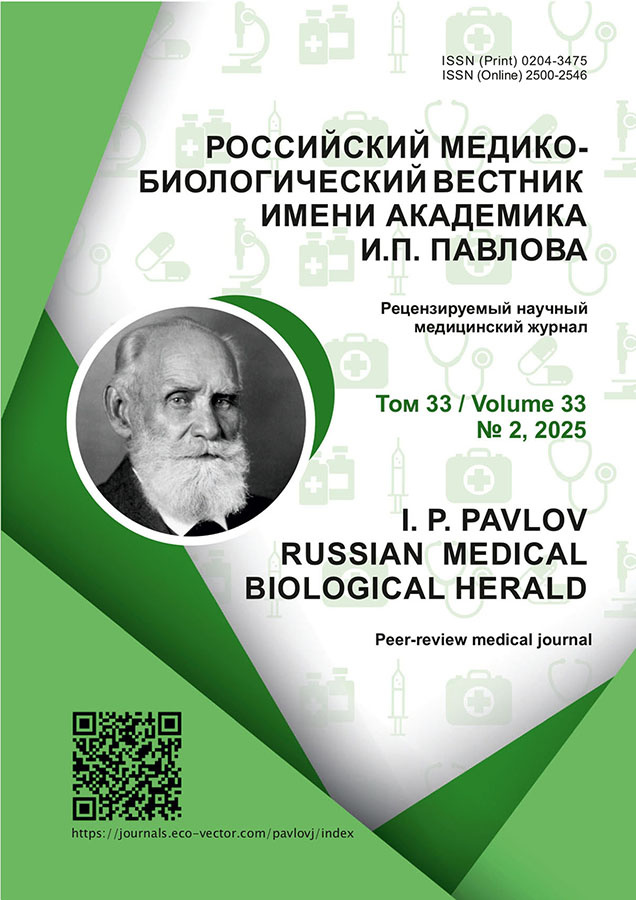Epidemiological Characteristics of Multiple Myeloma in the Republic of Crimea
- Authors: Kaliberdenko V.B.1, Useinova A.N.1, Ametova L.O.1, Kulieva E.R.1, Yakushev D.A.1
-
Affiliations:
- V.I. Vernadsky Crimean Federal University
- Issue: Vol 33, No 2 (2025)
- Pages: 173-179
- Section: Original study
- Submitted: 19.12.2023
- Accepted: 15.02.2024
- Published: 02.07.2025
- URL: https://journals.eco-vector.com/pavlovj/article/view/624305
- DOI: https://doi.org/10.17816/PAVLOVJ624305
- EDN: https://elibrary.ru/QUTHXV
- ID: 624305
Cite item
Abstract
INTRODUCTION: The epidemiology of multiple myeloma (MM) in Russia has not been sufficiently studied, however, it is important for understanding its prevalence in connection with increase in life expectancy of the population and the projected increase in morbidity MM.
AIM: To study the main epidemiological and clinical-demographic indicators of MM in the Republic of Crimea for 2019–2022.
MATERIALS AND METHODS: A prospective analysis of medical records of 173 patients with MM, who were undergoing outpatient and inpatient treatment in the hematology and chemotherapy department of Efetov Crimean Republican Oncological Clinical Dispensary was conducted. Statistical analysis of the data was conducted using the Microsoft Office application package and descriptive and parametric statistical methods.
RESULTS: Of the 713 patients MM were diagnosed of 91 women (66.5±11.1) years and 82 men (59.7±10.0) years. The men-to-women ratio was 0.9:1, which does not correspond to the global trends in MM development. The average incidence during the study period was 1.4 per 100 thousand, the average prevalence was 3.92 per 100 thousand, with the prevalence rate increased by 67.0% from the baseline. Patients with stage III of the disease according to the Durie–Salmon classification predominated — 97 (56.0%) patients. Mortality was 8.5 per 100 thousand among men and 6.0 per 100 thousand among women. The 5-year survival rate of patents with MM was 45.0%, the median survival was 38 months.
CONCLUSION: The prevalence of MM in the Republic of Crimea almost twice exceeds that in other regions of Russia. A steady increase in the incidence rate has been detected, which is probably due to improvement of the MM detectability as a result of regular prophylactic medical examinations of the population.
Keywords
Full Text
About the authors
Vitaliy B. Kaliberdenko
V.I. Vernadsky Crimean Federal University
Email: kaliberdenkovb@cfuv.ru
ORCID iD: 0000-0003-1693-3190
SPIN-code: 8395-2187
MD, Cand. Sci. (Medicine), Assistant Professor
Russian Federation, SimferopolAsie N. Useinova
V.I. Vernadsky Crimean Federal University
Email: mametova.as@mail.ru
ORCID iD: 0000-0003-0725-5455
SPIN-code: 9031-2079
MD, Cand. Sci. (Medicine), Assistant Professor
Russian Federation, SimferopolLilya O. Ametova
V.I. Vernadsky Crimean Federal University
Author for correspondence.
Email: ametova-lilya@bk.ru
ORCID iD: 0000-0003-1496-4954
SPIN-code: 5630-9650
Russian Federation, Simferopol
Elvina R. Kulieva
V.I. Vernadsky Crimean Federal University
Email: elvinaemir20@gmail.com
ORCID iD: 0009-0008-1130-7709
SPIN-code: 2196-2222
Russian Federation, Simferopol
Daniil A. Yakushev
V.I. Vernadsky Crimean Federal University
Email: bandan395@gmail.ru
ORCID iD: 0009-0003-4151-4382
SPIN-code: 7465-8149
Russian Federation, Simferopol
References
- Van de Donk NWCJ, Pawlyn C, Yong KL. Multiple myeloma. Lancet. 2021;397(10272):410–427. doi: 10.1016/S0140-6736(21)00135-5
- Skvortsova NV, Pospelova TI, Kovynev IB, et al. Epidemiology of Multiple Myeloma in Novosibirsk (Siberian Federal District). Clinical Onco-hematology. 2019;12(1):86–94. doi: 10.21320/2500-2139-2019-12-1-86-94 EDN: YWNKBV
- Luchinin AS, Semochkin SV, Minaeva NV, et al. Epidemiology of multiple myeloma according to the Кirov region population registers. Onco-hematology. 2017;12(3):50–56. doi: 10.17650/1818-8346-2017-12-3-50-56 EDN: ZNEFAR
- Vinogradova OYu, Ptushkin VV, Chernikov MV, et al. Epidemiology of multiple myeloma in city Moscow. Therapeutic Archive. 2019;91(7):83–92. doi: 10.26442/00403660.2019.07.000305 EDN: FEDIFJ
- Cowan AJ, Green DJ, Kwok M, et al. Diagnosis and Management of Multiple Myeloma: A Review. JAMA. 2022;327(5):464–477. doi: 10.1001/jama.2022.0003
- Padala SA, Barsouk A, Barsouk A, et al. Epidemiology, Staging, and Management of Multiple Myeloma. Med Sci (Basel). 2021;9(1):3. doi: 10.3390/medsci9010003
- Gómez-Almaguer D, de Moraes Hungria VT. Multiple myeloma in Latin America. Hematology. 2022;27(1):928–931. doi: 10.1080/16078454.2022.2112643
- Rajkumar SV. Multiple myeloma: 2022 update on diagnosis, risk stratification, and management. Am J Hematol. 2022;97(8):1086–1107. doi: 10.1002/ajh.26590
- Kaprin AD, Starinskiy VV, Shakhzadova AO, editors. Zlokachestvennyye novoobrazovaniya v Rossii v 2021 godu (zabolevayemost' i smertnost'). Moscow; 2022. (In Russ.)
- Tsang M, Le M, Ghazawi FM, et al. Multiple myeloma epidemiology and patient geographic distribution in Canada: A population study. Cancer. 2019;125(14):2435–2444. doi: 10.1002/cncr.32128
- Mousavi SE, Ilaghi M, Aslani A, et al. A population-based study on incidence trends of myeloma in the United States over 2000–2020. Sci Rep. 2023;13(1):20705. doi: 10.1038/s41598-023-47906-y
- Somasundaram A, Rothenberger NJ, Stabile LP. The Impact of Estrogen in the Tumor Microenvironment. Adv Exp Med Biol. 2020; 1277:33–52. doi: 10.1007/978-3-030-50224-9_2
- Yarman SA. Contemporary concepts about hormonal changes in the organism of woman with the physiological and pathologic course of the perimenopausal period. Zhurnal Akusherstva i Zhenskikh Bolezney. 2008;57(1):116–123. EDN: IKPRDB
- Rubin JB, Lagas JS, Broestl L, et al. Sex differences in cancer mechanisms. Biol Sex Differ. 2020;11(1):17. doi: 10.1186/s13293-020-00291-x
Supplementary files










